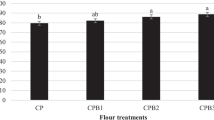Abstract
Quality standards for industrially processed food products are being prepared by a joint committee composed of the private sector, government and universities. These standards include specific dispositions which, if necessary, allow utilization of different ingredients-soya protein derivatives among them- to improve the quality and quantity of the protein or to balance the amino acid profile. Despite these efforts, in Venezuela, there are no clear-cut regulations about the utilization of soybean proteins either as a supplement or as an ingredient in the manufacture of food products for human consumption and, as such, its use is limited to a few items. Several reasons can be cited to explain this low use: (a) the incipient/scarce domestic production of soybeans; (b) the high cost of imported protein derivatives (only soya flour is fabricated in the country from imported beans); (c) lack of interest (apathy) and absence of proper knowledge or insufficient advice of the private industry; (d) lack of proper incentives from the government; and (e) unnecessary complications or delays in the registration procedures of the new products. Baby foods containing soya proteins in Venezuela can be grouped into the following categories- 1: cereal-based products elaborated by the private sector; 2: different food items distributed by the Intituto Nacional de Nutrición; 3: milk substitutes; 4: high-protein preparations used in special diets; 5: soya protein-enriched commercial flours. A general review of the composition, protein in gredients, presentation and availability of the different items within the five groups is presented and discussed. Emphasis is on the standards which regulate the commercial products in group 1. Comments are made about Venezuelan food habits and possible acceptance by consumers. Foods covered in group 2 include different types of biscuits, a Venezuelan bread (arepa) made with degerminated corn fortified with soya flour, and a ready-to-drink beverage. Group 3 covers a specific segment of the market and presently faces unavailability. Products under groups 4 and 5 could be used as a potential high-protein food for young children, although high costs of group 4 products present serious obstacles. Special reference is made to the soybean derivatives used in these products.
Similar content being viewed by others
References
Código Latinoamericano de Alimentos, Segunda Edición, Octavo Congreso Latinoamericano de Quimica, Estab. Gráfico “Sidus” S.R.L. República Argentina, 1964.
Código Sanitrio de Alimentos, Ministerio de Salud Pública y Asistencia Social, Lima, Perú, 1963.
Olszyna-Marzys, A., Legislación Alimentaria Latinoamericana en su efecto sobre alimentos de proteina de soya, Primera Conferencia Latinoamericana sobre la Proteina de Soya, México, 1975.
Norma COVENIN 744–78 “Aceites y Grasas Vegetales: Aceite de Soya Comestible,” Venezuela.
Anteproyecto IA COVENIN 10:003 “Alimentos para Animales: Harina de Soya, Requisitos” Venezuela.
Encuestas Efectuadas en Pablaciones del Departamento Acevedo, Estado Miranda, Instituo Nacional de Nutritión, Venezuela, 1970.
Estudio de Caracas, Volumen VII, Tomo 1, Ediciones de la Biblioteca, U.C.V. Caracas, 1971.
Pellet, P.L., Brit. J. Nutr. 21:609 (1967).
Ministerio de Fomento COVENIN 1452-79” Norma Venezolana: Alimentos Elaborados a Base de Cereales Para Niños,” 1979.
Chávez, J.F., “Mejoramiento Nutricional del Maiź,” Publicación INCAP L-3, 1972.
Informe de las Unidades de Nutrición, Archivo de la Dirección Operativa, Instituto Nacional de Nutrición, Venezuela, Sept. 1980.
Consideraciones sobre alimentación y nutrición en Venezuela, Consejo Técnico del Instituto Nacional de Nutrición de Venezuela, June 1980.
Ministerio de Fomento, COVENIN 909–79, “Norma Venezolana: Fórmulas Alimenticias para niños de Pecho,” 1979.
Resolución sobre Alimentos para Regimenes Especiales, Venezuela, Gaceta Oficial No. 31, 106 de fecha, Nov. 1976.
Author information
Authors and Affiliations
About this article
Cite this article
Chavez, J.F. Consideration of regulations of baby foods containing soybeans in Venezuela. J Am Oil Chem Soc 58, 448–451 (1981). https://doi.org/10.1007/BF02582400
Issue Date:
DOI: https://doi.org/10.1007/BF02582400




